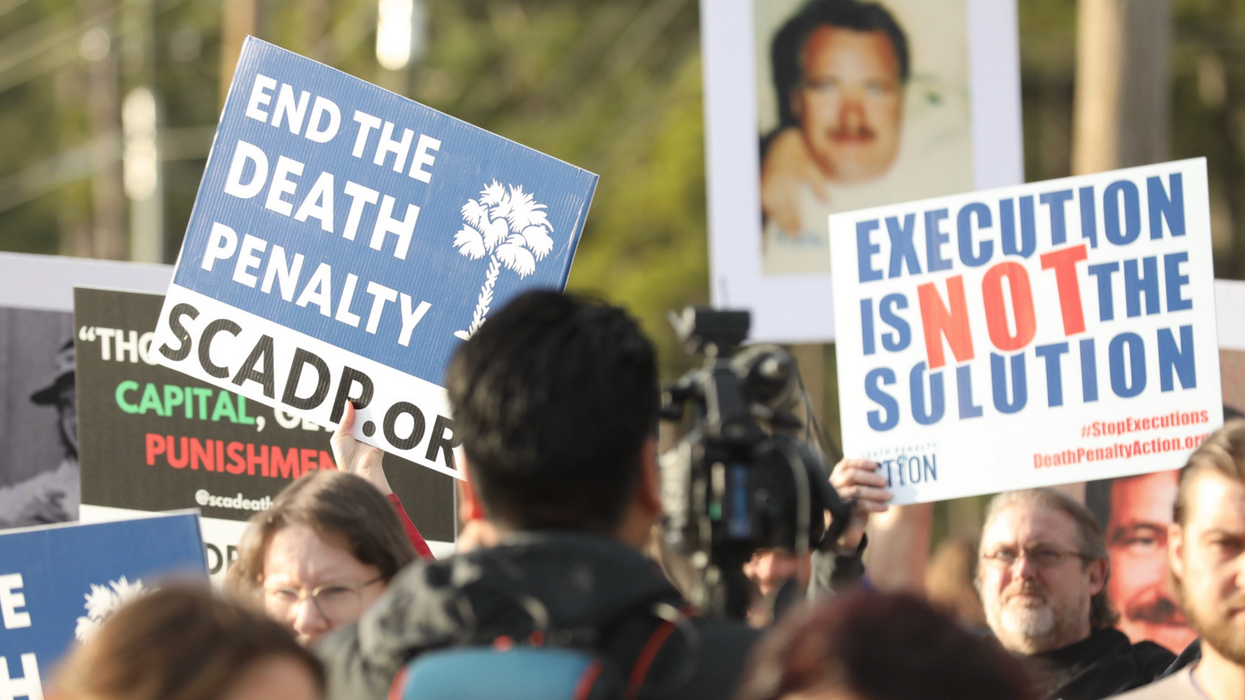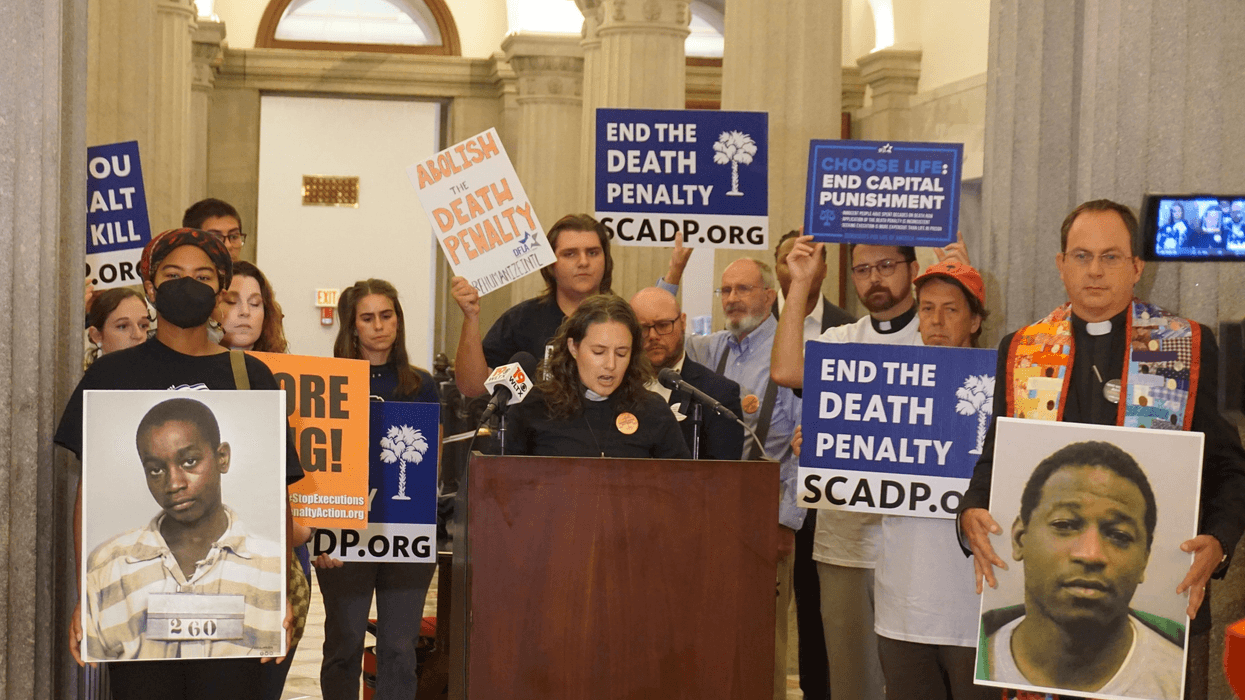Amid Global Calls to End Capital Punishment, US Set to Execute 7 Men This Month
"We won’t give up until the death penalty is abolished everywhere," said Amnesty International on World Day Against the Death Penalty. "Change is possible."
Human rights defenders marked World Day Against the Death Penalty on Friday by renewing pleas to end capital punishment—calls that came amid a surge in US executions and the Trump administration's extrajudicial high-seas massacres of alleged drug traffickers.
"The death penalty does little to deter crime or serve victims," the United Nations said on social media. "It has no place in the 21st century."
Noting that two-thirds of the world's countries have abolished capital punishment, the UN human rights office asserted that "it's time to end it—everywhere, for everyone."
"You can free a prisoner. You can clear a conviction. But you can’t correct an execution," the office said. "Innocent people are sentenced to death, in many regions of the world. And those who are executed are rarely the powerful. It’s the poor, the marginalized, those with the fewest means to defend themselves."
"The death penalty doesn’t prevent crime," it added. "It doesn’t deliver justice. It only repeats violence, in the name of the law."
We must end the death penalty, once and for all.On this World Day Against the Death Penalty, add your name to the growing number of people calling for an end to capital punishment.
[image or embed]
— ACLU (@aclu.org) October 10, 2025 at 7:19 AM
Amnesty International said on social media, "Over the past year, executions have significantly increased in countries such as Singapore, Kuwait, Iran, and the USA, while people continue to be executed at an alarming rate in Saudi Arabia."
"Among these rises, some governments have shown renewed determination to use this cruel punishment as a tool of repression and control," Amnesty continued. "They continue to ignore international human rights law.
The group noted on a hopeful note that "the number of countries resorting to the death penalty is decreasing.”
"We won’t give up until the death penalty is abolished everywhere," Amnesty added. "Change is possible."
European Parliament Human Rights Subcommittee Chair Mounir Satouri reaffirmed lawmakers' "absolute opposition to the death penalty, under all circumstances and without exception."
"The death penalty constitutes a cruel punishment that fundamentally denies human dignity and is incompatible with the right to life and with the prohibition of torture," he said.
“Today, more than two-thirds of all countries have either abolished the death penalty in law or no longer implement it in practice. 113 countries had abolished the death penalty in law by the end of 2024," Satouri noted. "I urge the remaining 55 states that continue to impose or carry out death sentences to establish a moratorium as an initial step toward its complete abolition."
“It has been proven that the death penalty does not deter crime and that its imposition disproportionately affects vulnerable groups," he added. "Moreover, in today's more authoritarian global environment, the death penalty and assassinations sponsored by authoritarian regimes are used as a political tool against political opponents, independent journalists, and human rights defenders."
Those remarks came as US President Donald Trump faces condemnation at home and abroad for ordering a series of extrajudicial assassinations of what his administration claims are drug traffickers transporting narcotics in small boats in the Caribbean Sea off the Venezuelan coast.
Trump—who oversaw a resurgence of federal executions during his first term—signed an executive order on his first day back in the White House affirming capital punishment as "an essential tool for deterring and punishing those who would commit the most heinous crimes," despite study after study showing it does not deter criminal activity.
Capital punishment abolitionists earlier this year denounced US Attorney General Pam Bondi's decision to seek the death penalty for Luigi Mangione, the 26-year-old man accused of killing UnitedHealthcare CEO Brian Thompson in December 2024. More recently, Bondi has also ominously threatened to take the "same approach" to anti-fascist protesters as the administration has taken against drug cartels.
However, human rights defenders are currently most alarmed by a surge in executions in Republican-controlled states, where Indiana death row inmate Roy Lee Ward—who was killed by lethal injection on Friday—was the first of five scheduled executions in the coming week.
Next Tuesday, Lance Shockley in Missouri and Samuel Lee Smithers in Florida are set to be executed. Smithers would be the 14th person to be killed this year under the direction of Republican Florida Gov. Ron DeSantis, whose expansion of the state's capital punishment regime has raised constitutional concerns.
On Wednesday, Charles Ray Crawford is scheduled to be executed in Mississippi, while Arizona is set to put Richard Djerf to death on October 17.
In a rare reprieve, the Texas Court of Criminal Appeals on Thursday blocked next week's scheduled execution of Robert Roberson—who was convicted of murdering his 2-year-old daughter on the basis of scientifically debunked "shaken baby syndrome"—by sending his case back to court.
Update: The Texas Court of Criminal Appeals granted Robert Roberson a stay of execution October 9, a week before he was set to be killed. A lower court will now reconsider Roberson’s case.
[image or embed]
— Texas Observer (@texasobserver.org) October 9, 2025 at 4:00 PM
Two more executions—Anthony Todd Boyd in Alabama and Norman Mearle Grim in Florida—are planned for later this month.
There have been 35 executions in the United States so far this year, up from 25 in 2024 and the most since 2017, according to the Death Penalty Information Center.
Noting that October is "Respect Life Month" in the United States, Catholic Mobilizing Network executive director Krisanne Vaillancourt Murphy told Vatican News Friday that “it's a stark contrast to honoring all human life that we see such an affront to the dignity of the human person."
"We need to value the dignity of every human person," Vaillancourt added. "That includes people who are sitting on death row. So we will not give up this fight. And the progress that we've made has been hard-won. We will move forward and continue in order to end the death penalty in the United States.”


